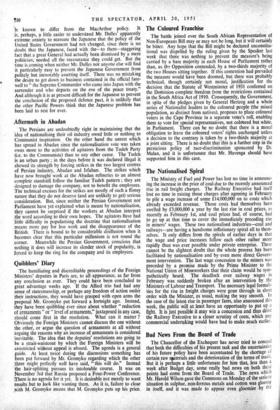The Nationalised Spiral
The Ministry of Fuel and Power has lost no time in announc- ing the increase in the price of coal due to the recently announced rise in rail freight charges. The Railway Executive had itself lost no time in raising those charges after agreeing in February to pile a wage increase of some £14,000,000 on to costs which already exceeded revenue. Those costs had themselves been swelled by £3,000,000 a year by the last rise in coal prices, as recently as February 1st, and coal prices had, of course, had to go up at that time to cover the immediately preceding rise in miners' wages. These two nationalised industries—coal and railways—are having a handsome inflationary spiral all to them- selves. It only differs from the spirals of earlier days in that the wage and price increases follow each other rather more rapidly than was ever possible under private enterprise. There cannot be the slightest doubt that the whole process has been facilitated by nationalisation and by even more direct Govern- ment intervention. The last wage concession to the miners was preceded by a promise made by the Prime Minister to the National Union of Mineworkers that their claim would be sym- pathetically heard. The deadlock over railway wages in February was suddenly broken after an intervention by the Ministers of Labour and Transport. The necessary legal formali- ties for the rise in freight charges were gone through in short order with the Minister, as usual, making the way smooth. In case of the latest rise in passenger fares, also announced this week, the public will at least have an opportunity to put up a fight. It is just possible it may win a concession and thus drive the Railway Executive to a closer scrutiny of costs, which any commercial undertaking would have had to make much earlier.


































 Previous page
Previous page